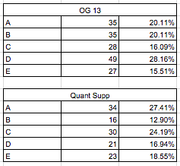himu wrote:
If n is a positive integer greater than 6, what is the remainder when n is divided by 6?
(1) n^2 - 1 is not divisible by 3.
(2) n^2 - 1 is even.
Approach 1:
Since n is greater than 6, and the statements refer to n², make a list of perfect squares greater than 6²:
n² = 49, 64, 81, 100, 121, 144, 169, 196, 225.
Subtracting 1 from these values, we get the following options for n² - 1:
n² - 1 =
48, 63, 80, 99, 120, 143, 168, 195, 224.
Statement 1: n² - 1 is not divisible by 3
From the list in red, the following options are viable:
80, 143, 224.
If n² - 1 = 80, then n=9, which yields a remainder of 3 when divided by 6.
If n² - 1 = 143, then n=12, which yields a remainder of 0 when divided by 6.
Since the remainder can be different values, INSUFFICIENT.
Statement 2: n² - 1 is even
From the list in red, the following options are viable:
48, 80, 120, 168, 224.
If n² - 1 = 48, then n=7, which yields a remainder of 1 when divided by 6.
If n² - 1 = 80, then n=9, which yields a remainder of 3 when divided by 6.
Since the remainder can be different values, INSUFFICIENT.
Statements combined:
From the list in red, the following options satisfy both statements:
80, 224.
If n² - 1 = 80, then n=9, which yields a remainder of 3 when divided by 6.
If n² - 1 = 224, then n=15, which yields a remainder of 3 when divided by 6.
Since the remainder is the same in each case, SUFFICIENT.
The correct answer is
C.
Approach 2:
n-1, n, and n+1 are 3 consecutive integers.
Of every 3 consecutive integers, EXACTLY ONE must be a multiple of 3.
Statement 1: n² - 1 is not divisible by 3
(n-1)(n+1) = non-multiple of 3.
Implication:
Since neither n-1 nor n+1 is a multiple of 3 -- and one of every 3 consecutive integers must be a multiple of 3 -- n MUST BE A MULTIPLE OF 3.
If n=9, then dividing by 6 will yield a remainder of 3.
If n=12, then divided by 6 will yield a remainder of 0.
Since the remainder can be different values, INSUFFICIENT.
Statement 2: n² - 1 is even
(n-1)(n+1) = even.
Implication:
n-1 and n+1 must both be even, implying that n is ODD.
If n=7, then dividing by 6 will yield a remainder of 1.
If n=9, then dividing by 6 will yield a remainder of 3.
Since the remainder can be different values, INSUFFICIENT.
Statements combined:
Statement 1: n is a multiple of 3
Statement 2: n is odd
Options for n:
9, 15, 21, 27...
In every case, dividing by 6 will yield a remainder of 3.
SUFFICIENT.
The correct answer is
C.
Private tutor exclusively for the GMAT and GRE, with over 20 years of experience.
Followed here and elsewhere by over 1900 test-takers.
I have worked with students based in the US, Australia, Taiwan, China, Tajikistan, Kuwait, Saudi Arabia -- a long list of countries.
My students have been admitted to HBS, CBS, Tuck, Yale, Stern, Fuqua -- a long list of top programs.
As a tutor, I don't simply teach you how I would approach problems.
I unlock the best way for YOU to solve problems.
For more information, please email me (Mitch Hunt) at
[email protected].
Student Review #1
Student Review #2
Student Review #3